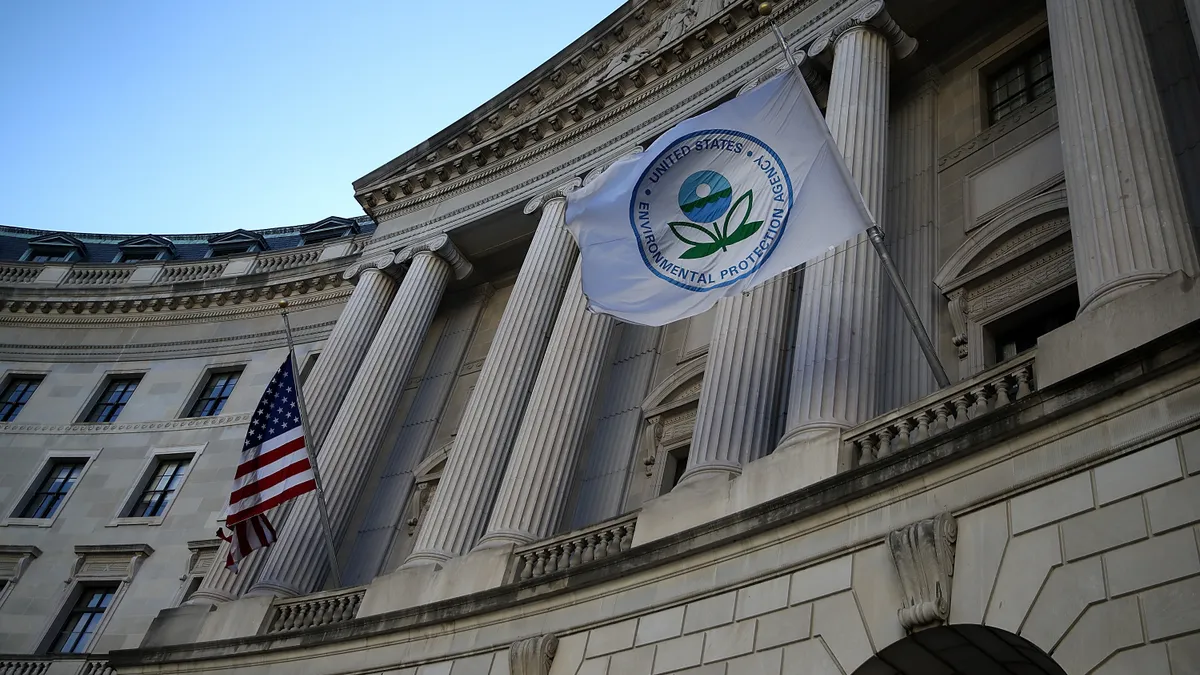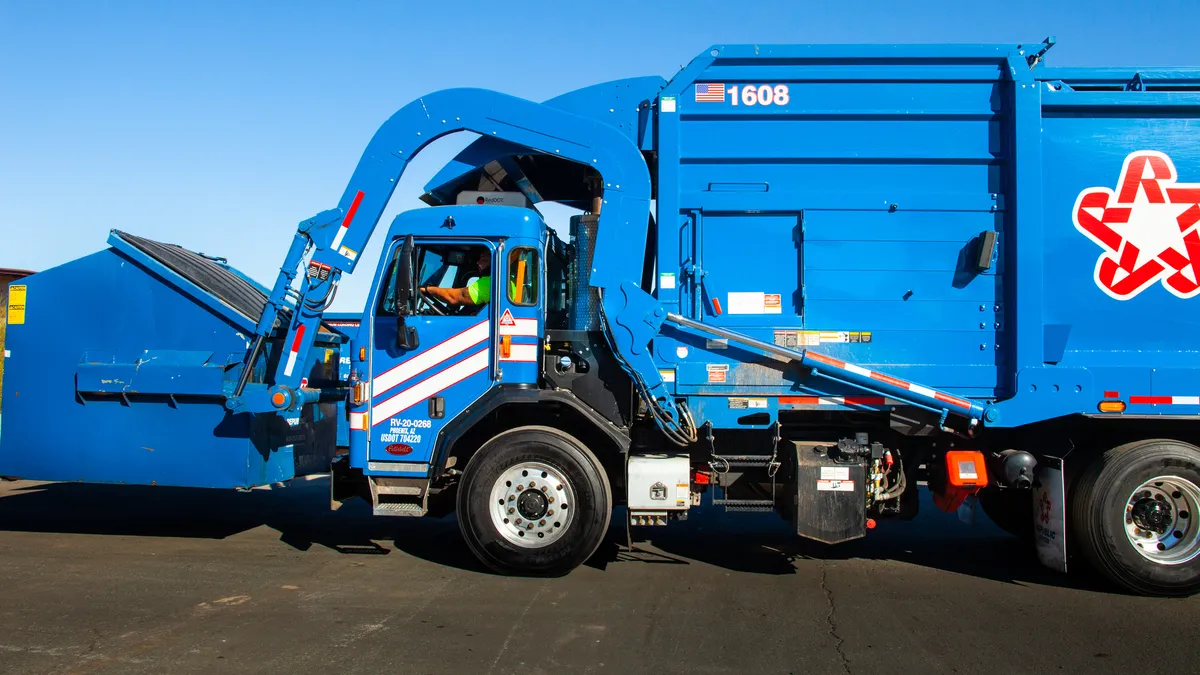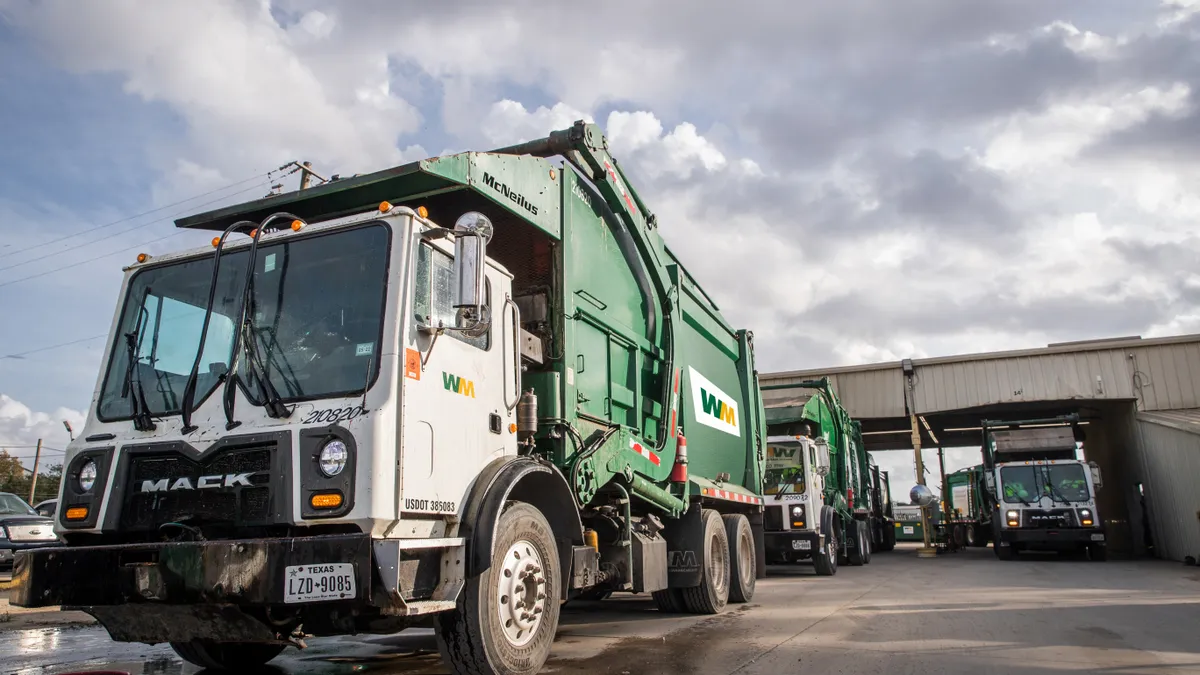Welcome to Scrap Collector, Waste Dive's Friday round-up of insights and stories you may have missed during the week.
NEW NYC LEGISLATION TAKES AIM AT PRIVATE TRASH INDUSTRY CORRUPTION
The New York City Council handed labor advocates a victory on Thursday with its passage of three bills aimed at strengthening worker protections across the private sanitation industry.
The first measure, sponsored by Council Member Antonio Reynoso, mandates that waste industry unions register with the Business Integrity Commission (BIC). Union officials found lacking in "good character, honesty and integrity" — including those with certain criminal convictions or with ties with organized crime — will be barred by BIC from representing workers in the industry. Reynoso's second bill requires BIC to "inform the New York state attorney general, the New York state Department of Labor, the United States Department of Labor or other relevant city, state or federal law enforcement agency" of possible wage or labor law violations.
The final bill, sponsored by Council Member Francisco Moya, obligates private carters to inform employees of all relevant regulations associated with working conditions and payment.
"The private sanitation industry operates without regard for the health and safety of its workers or the city at large," Reynoso said at a press conference ahead of the vote, as reported by Crain's New York. "It is not only the companies themselves that are complicit in this disgraceful behavior. In many of these shops, it is the very unions who are supposed to protect these workers who are aiding and abetting their mistreatment."
Sean Campbell, President of Teamsters Local 813, commended the legislation for closing a "loophole" in BIC's oversight of private trash industry unions.
"The BIC will now have the authority to license and investigate these individuals, forcing them out of the shadows and into the light," he said in a statement. "We believe many will not stand up to scrutiny." However, Campbell emphasized, enacting the city's commercial waste zone proposal remains a necessary prerequisite to securing fundamental labor rights for sanitation workers.
Anti-zoning trade association New Yorkers for Responsible Waste Management (NYRWM) found a rare point of consensus with labor groups, using the opportunity to tout its own messaging.
"NYRWM applauds the Council's passage of today’s bills and encourages the Mayor to sign. We look forward to posting the proposed 'workers’ bill of rights' and to BIC's review and certification of all of the industry’s unions," said Executive Director Kendall Christiansen in a statement. "These bills show that best practices can be affirmed and regulated effectively within the current open-market system without the need for an untested system of zones and city-picked service providers that at best would not take effect for several years."
IN OTHER NEWS...
Microplastics ingested by animals in Earth's deepest marine ecosystems — The Atlantic
We take no pleasure in bringing you this update to our previous Mariana Trench microplastics coverage: according to new research published in Royal Society Open Science, microplastics and other synthetic particles were found in 72% of amphipods collected from six deep-sea trenches — including the 6.8-mile-deep Mariana Trench, where 100% of surveyed organisms contained traces of plastic.
"This study reports the deepest record of microplastic ingestion, indicating it is highly likely there are no marine ecosystems left that are not impacted by plastic pollution," the paper concludes.
As researchers note, the presence of plastic in amphipods — seabed-dwelling crustaceans that inhabit the bottom of food webs — bears potentially devastating repercussions for trench ecosystems. Animals that prey on amphipods also wind up consuming plastic, and, once they die, are scavenged on by amphipods — raising a "strong possibility" that microplastics will be "locked into a perpetual cycle of trophic transfer" once they enter the deep-sea food chain.
"What you put in the trench stays in the trench," says lead author Alan Jamieson. "[The plastic problem] is only going to get worse. Anything going in there isn't coming back."
Microplastic ingestion, according to the paper, has been found to "negatively affect approximately 700 marine species, primarily through ingestion, decreased nutrition from intestinal blockage or decreased mobility." Plastic could also act as a vector for toxic pollutants — including long-banned polychlorinated biphenyls (PCBs), which have been linked to cancer, immune system suppression, disrupted hormone signals and impaired reproduction.
And while the full extent of potential repercussions isn't yet known, oceanographer Anela Choy stresses the need for immediate action: "We certainly don't need decades of further scientific study to necessitate more responsible behavior and policies now."
AROUND THE WORLD
Canada considering new "right to repair" bill — Motherboard
Apple and other tech behemoths engaged in an endless game of whack-a-mole with pro-repair legislation have a new contender in their midst: an Ontario bill introduced last Thursday is seeking to become the first "right to repair" law for electronic devices in North America.
The legislation, which was proposed by Liberal Party MPP Michael Coteau, would mandate that tech companies provide diagnostic tools, repair manuals and official parts to consumers upon request; it would also require products to come with a repair manual. Documents provided must be free unless customers request paper copies, and parts, tools and software must come at a fair price.
As iFixit CEO Kyle Wiens noted last year, the passage of right to repair legislation anywhere could break the proverbial dam: "If Ontario decided 'We're going to pass the Right to Repair legislation,' that could actually pass Right to Repair for the world, because manufacturers aren't going to provide products differently to people in one jurisdiction. They want to simplify their operations."
It's a development that would help mitigate not just the financial burden on consumers, but the profound environmental strain of e-waste — the fastest-growing waste stream in the world, as highlighted in a Jan. 2019 report by the Platform for Accelerating the Circular Economy (PACE).
"Repair is a critical part of fixing our relationship with these products, and is more efficient than recycling," observes Nathan Proctor, director of U.S. PIRG's Right to Repair campaign. "We have way too much waste in the world to only have the companies that manufacture products repair them."
SEEN & HEARD
Attention freelancers: It's a great time to be covering the waste and recycling world (especially recycling) and we're looking for more help at @WasteDive. Come join us! https://t.co/lcjbViUAKX
— Cole Rosengren (@ColeRosengren) February 25, 2019
Heidi Sanborn presenting at EPR summit at #SWANApalooza. “Why are we privatizing 100% of the profits [from products] and socializing 100% of the costs?” Manufacturers should help pay for end-of-life! @CLF @storyofstuff @brkfreeplastic pic.twitter.com/bWbYcQuRb4
— John Hite (@JohniHite) February 28, 2019
How is Taipei, Taiwan, a bustling city of nearly 2.7 million people, shops, cafes, food stands, etc. so free of litter? I didn't see one item on an over 1000m walk. Gutters free of human debris. I have a hypothesis... #PlanetorPlastic #PlasticPollution @DebrisTracker pic.twitter.com/yzo9eRM034
— Jenna Jambeck (@JambeckResearch) February 22, 2019


















